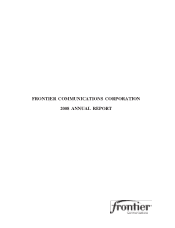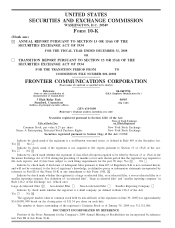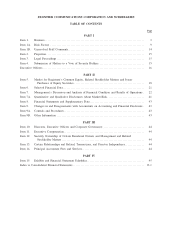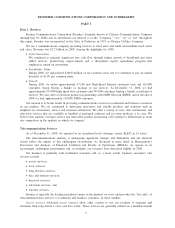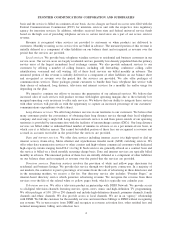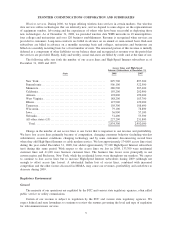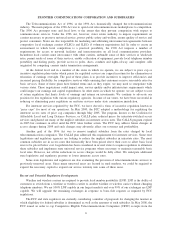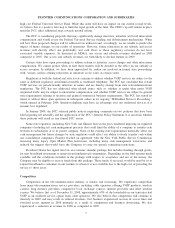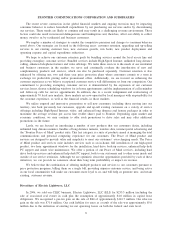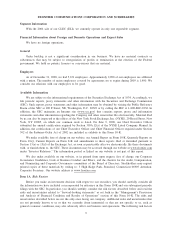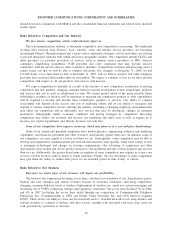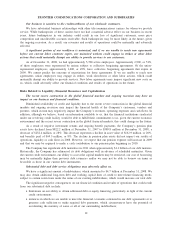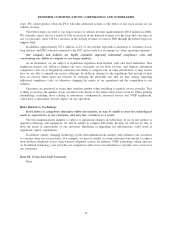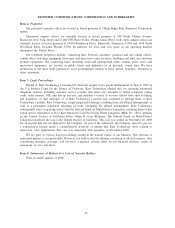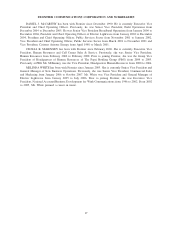Frontier Communications 2008 Annual Report Download - page 8
Download and view the complete annual report
Please find page 8 of the 2008 Frontier Communications annual report below. You can navigate through the pages in the report by either clicking on the pages listed below, or by using the keyword search tool below to find specific information within the annual report.high cost Federal Universal Service Fund. While this order will have no impact on our current receipt levels,
we believe this is a positive first step to limit the rapid growth of the fund. The CETC cap will remain in place
until the FCC takes additional steps towards needed reform.
The FCC is considering proposals that may significantly change interstate, intrastate and local intercarrier
compensation and would revise the Federal Universal Service funding and disbursement mechanisms. When
and how these proposed changes will be addressed are unknown and, accordingly, we are unable to predict the
impact of future changes on our results of operations. However, future reductions in our subsidy and access
revenues will directly affect our profitability and cash flows as those regulatory revenues do not have
associated variable expenses. As discussed in MD&A, our access and subsidy revenues declined in 2008
compared to 2007. Our access and subsidy revenues are both likely to decline further in 2009.
Certain states have open proceedings to address reform to intrastate access charges and other intercarrier
compensation. We cannot predict when or how these matters will be decided or the effect on our subsidy or
access revenues. In addition, we have been approached by, and/or are involved in formal state proceedings
with, various carriers seeking reductions in intrastate access rates in certain states.
Regulators at both the federal and state levels continue to address whether VOIP services are subject to the
same or different regulatory and financial models as traditional telephony. The FCC has concluded that certain
VOIP services are jurisdictionally interstate in nature and are thereby exempt from state telecommunications
regulations. The FCC has not addressed other related issues, such as: whether or under what terms VOIP
originated traffic may be subject to intercarrier compensation; and whether VOIP services are subject to general
state requirements relating to taxation and general commercial business requirements. The FCC has stated its
intent to address these open questions in subsequent orders in its ongoing “IP-Enabled Services Proceeding,”
which opened in February 2004. Internet telephony may have an advantage over our traditional services if it
remains less regulated.
In January 2008, the FCC released public notices requesting comments on two petitions that have been
filed regarding net neutrality and the application of the FCC’s Internet Policy Statement. It is uncertain whether
these petitions will result in any formal FCC action.
Some state regulators (including New York and Illinois) have in the past considered imposing on regulated
companies (including us) cash management practices that could limit the ability of a company to transfer cash
between its subsidiaries or to its parent company. None of the existing state requirements materially affect our
cash management but future changes by state regulators could affect our ability to freely transfer cash within
our consolidated companies. Frontier reached an agreement with the New York Public Service Commission
removing many legacy Open Market Plan restrictions, including many cash management restrictions, and
reduced the triggers that would force the Company to carry out specific remaining restrictions.
President Obama has signed into law an economic stimulus package that includes funding, through grants,
for new broadband investment to unserved and underserved communities. Depending on the final amount made
available and the conditions included in the package with respect to acceptance and use of the money, the
Company may be eligible to receive funds from this package. These funds, if received, would be used by us to
expand broadband to customers in our markets to whom it is not available due to the high cost of providing the
service to those areas.
Competition
Competition in the telecommunications industry is intense and increasing. We experience competition
from many telecommunications service providers, including cable operators offering VOIP products, wireless
carriers, long distance providers, competitive local exchange carriers, internet providers and other wireline
carriers. We believe that as of December 31, 2008, approximately 65% of the households in our territories had
VOIP as an available service option from cable operators. We also believe that competition will continue to
intensify in 2009 and may result in reduced revenues. Our business experienced erosion in access lines and
switched access minutes in 2008 primarily as a result of competition and business downsizing. We also
experienced a reduction in revenue in 2008 as compared to 2007.
7
FRONTIER COMMUNICATIONS CORPORATION AND SUBSIDIARIES

